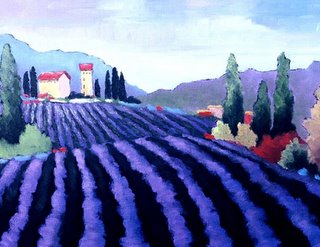"The lavendar farm" [ghazal]
If Urdu had usurped all the charm a ghazal can possess
might English shadow-box with the arm a ghazal can possess?
Granted Urdu snaffled from Farsi attar as well as dard
in which of these should I seek the Marm a ghazal can possess?
Is paradise so distant? are myths mere myths? what is language?
I crave the medicine & the harm a ghazal can possess
I stumbled field to field flummoxed by the sinewy labor
an aerial vantage of the farm a ghazal can possess
Ardeo vaguely guessed his heart must have a reason to beat
could it be it sought the plangent dharm a ghazal can possess?
In wintertime no flowery talk all of the voices hushed
fresh hubbub! this might be the alarm a ghazal can possess
I gazed up at the balcony only drapes amid the breeze!
& yet one felt that flap hid the charm a ghazal can possess
The gul of Saadi's long gone! where's the rukh of the moon tonight?
if Hafez spoke English say what yarn a ghazal might possess?
He alone holds the secret! we fools rush about and angels?
it's the pin where they dance in a swarm a ghazal can possess
When old Anglos were a'breeding their sheep & a'brewing their beer
none visited the lavendar farm a ghazal can possess?
My commerce proved absurd! at least I survived only poems
received every grain from my barn that a ghazal can possess
Ardeo felt pensive no Urdu belovèd consoled him
he hugged such wan English (his karm) as a ghazal can possess
acknowledgement
The first line of the first couplet quotes (not quite verbatim) a remark made by noted Delhi poet and actor Danish Husain -- for which, thanks.
This poem (in one respect) amounts to an attempted reply to Dan's provocative utterance. Whether Dan's observation serves to paraphrase a well-known Urdu truism, I can't say; but no doubt, the underlying thought here is a familiar one: that (a few centuries into the past, in the Indian subcontinent -- & indeed in broad realms of Islamicized culture), Urdu arguably "usurped" the ghazal preeminence erstwhile enjoyed by Farsi. As for Urdu's noted, stealthy excellences -- the above ghazal tacitly presumes to attempt a counter-appropriation -- at least to the extent of some smidge purloined from those olden glories.

Whether (meanwhile) Urdu might eventually suffer from its karma of usurption, is a question beyond the scope of this footnote.
notes
Dan's original sentence reads: "Urdu has usurped all that charm that a ghazal can possess." The poem's first sher [couplet] replies to this.
attar (Farsi/Urdu) : perfume
dard (Farsi/Urdu) : pain, suffering, grief
dharm (Hindi/Urdu) : from Sanskrit dharma, the necessary duty, sphere of appropriate work, and raison d'etre peculiar to each jivatman (embodied soul).
gul (Farsi/Urdu) : the rose
rukh (Farsi/Urdu) : the face
Hafez and Saadi are the most noted poets from the old Persian city of Shiraz. Hafez is generally esteemed as the most sublime of classical Persian ghazal poets. Saadi was also a writer of ghazals, but he is perhaps best known for his prose + poetry writings, such as the Gulistan (Rose Garden).
karm (Hindi/Urdu) : equivalenet to the Sanskrit karma = action, or (philosophically conceived), the cycle of action and its consequence; or (metaphysically construed), by extension, the results, in a given lifetime, of actions committed in prior lifetimes (or, the seeds, in a current lifetime, for conditions to be experienced in future lifetimes). Karma is in some respects similar to the universal idea of "fate"; but if so, it involves a very sophisticated view of that idea. The doctrine of karma is shared by Hinduism and Buddhism, and is undoubtedly central to the legacy of ideas that India has, since antiquity, contributed to the world.
p.s.: following from Dan Husain's advice (here), I've been, with this, perhaps more attentive than usual to the specific metrics of the lines (though the poem remains inconsistent on a micro-level). I'm not sure whether a perfectly identical metrical rhythm in every line, is a desideratum for an English ghazal; but it does present a tantalizing possibility -- one I'll likely play with more in future.
might English shadow-box with the arm a ghazal can possess?
Granted Urdu snaffled from Farsi attar as well as dard
in which of these should I seek the Marm a ghazal can possess?
Is paradise so distant? are myths mere myths? what is language?
I crave the medicine & the harm a ghazal can possess
I stumbled field to field flummoxed by the sinewy labor
an aerial vantage of the farm a ghazal can possess
Ardeo vaguely guessed his heart must have a reason to beat
could it be it sought the plangent dharm a ghazal can possess?
In wintertime no flowery talk all of the voices hushed
fresh hubbub! this might be the alarm a ghazal can possess
I gazed up at the balcony only drapes amid the breeze!
& yet one felt that flap hid the charm a ghazal can possess
The gul of Saadi's long gone! where's the rukh of the moon tonight?
if Hafez spoke English say what yarn a ghazal might possess?
He alone holds the secret! we fools rush about and angels?
it's the pin where they dance in a swarm a ghazal can possess
When old Anglos were a'breeding their sheep & a'brewing their beer
none visited the lavendar farm a ghazal can possess?
My commerce proved absurd! at least I survived only poems
received every grain from my barn that a ghazal can possess
Ardeo felt pensive no Urdu belovèd consoled him
he hugged such wan English (his karm) as a ghazal can possess
| | | | | | | | | | | | | | | | | | | | | | | | |
acknowledgement
The first line of the first couplet quotes (not quite verbatim) a remark made by noted Delhi poet and actor Danish Husain -- for which, thanks.
This poem (in one respect) amounts to an attempted reply to Dan's provocative utterance. Whether Dan's observation serves to paraphrase a well-known Urdu truism, I can't say; but no doubt, the underlying thought here is a familiar one: that (a few centuries into the past, in the Indian subcontinent -- & indeed in broad realms of Islamicized culture), Urdu arguably "usurped" the ghazal preeminence erstwhile enjoyed by Farsi. As for Urdu's noted, stealthy excellences -- the above ghazal tacitly presumes to attempt a counter-appropriation -- at least to the extent of some smidge purloined from those olden glories.

Whether (meanwhile) Urdu might eventually suffer from its karma of usurption, is a question beyond the scope of this footnote.
notes
Dan's original sentence reads: "Urdu has usurped all that charm that a ghazal can possess." The poem's first sher [couplet] replies to this.
attar (Farsi/Urdu) : perfume
dard (Farsi/Urdu) : pain, suffering, grief
dharm (Hindi/Urdu) : from Sanskrit dharma, the necessary duty, sphere of appropriate work, and raison d'etre peculiar to each jivatman (embodied soul).
gul (Farsi/Urdu) : the rose
rukh (Farsi/Urdu) : the face
Hafez and Saadi are the most noted poets from the old Persian city of Shiraz. Hafez is generally esteemed as the most sublime of classical Persian ghazal poets. Saadi was also a writer of ghazals, but he is perhaps best known for his prose + poetry writings, such as the Gulistan (Rose Garden).
karm (Hindi/Urdu) : equivalenet to the Sanskrit karma = action, or (philosophically conceived), the cycle of action and its consequence; or (metaphysically construed), by extension, the results, in a given lifetime, of actions committed in prior lifetimes (or, the seeds, in a current lifetime, for conditions to be experienced in future lifetimes). Karma is in some respects similar to the universal idea of "fate"; but if so, it involves a very sophisticated view of that idea. The doctrine of karma is shared by Hinduism and Buddhism, and is undoubtedly central to the legacy of ideas that India has, since antiquity, contributed to the world.
p.s.: following from Dan Husain's advice (here), I've been, with this, perhaps more attentive than usual to the specific metrics of the lines (though the poem remains inconsistent on a micro-level). I'm not sure whether a perfectly identical metrical rhythm in every line, is a desideratum for an English ghazal; but it does present a tantalizing possibility -- one I'll likely play with more in future.


2 Comments:
you are a romantic David... and someday, if you learn Urdu, you'll cry...
i'm stumped.. this is beautiful..!!
i love the way your writing makes people think colors...
:)
it's beautiful.. i like it :)..
Post a Comment
<< Home